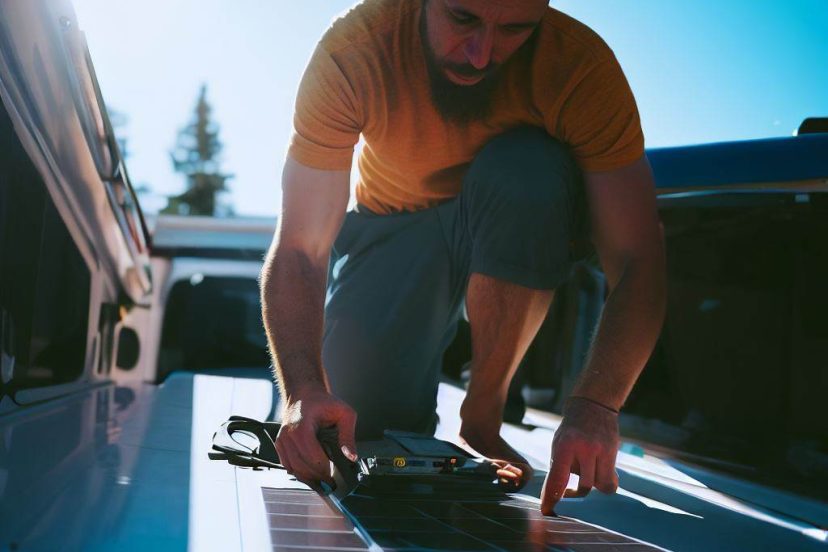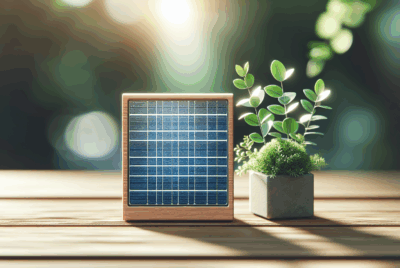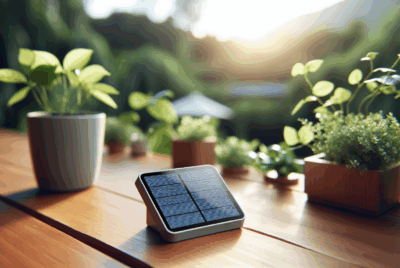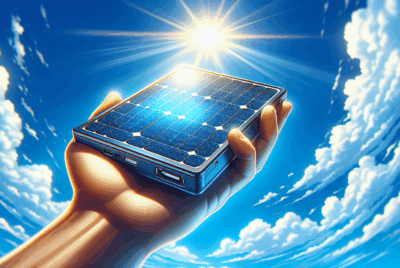400 Watt Solar Panel: A Comprehensive Guide
As an Amazon Associate, I earn from qualifying purchases, at no additional cost to you. Disclaimer
Introduction
Ever dream of hitting the open road in an RV, camping out under the stars, and living life on your own terms? Welcome to the realm of a 400 Watt Solar Panel, where freedom meets sustainability!
What is a 400 Watt Solar Panel?
My friends, I still remember the day I discovered the power of the sun. Yes, the big, bright star that lights up our days. It was on a perfect camping trip when my old gas generator sputtered to its last breath, leaving me literally in the dark. That’s when I discovered the world of solar power and, more specifically, the magic of a 400 Watt solar panel.
At the heart of it, a 400 Watt solar panel is a powerful ally for any modern adventurer or home-owner. In essence, it’s an arrangement of solar cells neatly packed in a frame that has the power to convert sunlight into electricity. The 400 Watt bit? That’s the maximum amount of power it can produce under ideal conditions.
Embarking on this solar journey
Now, let’s imagine for a moment: you’re sitting in a beautiful, secluded spot, basking in the sun, miles away from the nearest power outlet. Yet, you’re sipping a freshly blended smoothie, your phone is playing your favorite tunes, and your laptop is ready for a movie night under the stars. All this, my friend, is the magic a 400 Watt solar panel can bring to your life.
Here are a few tips to keep in mind:
Research: Just like buying a car or a house, purchasing a solar panel requires careful consideration. So, dive deep into the world of solar panels. Understand the different types available, their efficiency rates, and costs before making a decision.
Get Professional Help: If you’re a first-timer with no electrical experience, it’s wise to hire a professional for installation. Remember, safety always comes first.
Calculate Your Energy Needs: A 400 Watt solar panel is powerful, but is it enough for your needs? Before you jump in, take a good look at your energy consumption. You don’t want to end up with a battery that’s drained faster than it charges.
Consider the Weather: Solar panels love the sun. So, if you live in a region with long winter months or frequent rainfall, you might need to consider a backup power source.
From my experience, going solar has been one of the best decisions I’ve made. Not only does it give me the freedom to venture wherever I want, but it also helps me do my bit for the environment
Why Choose a 400 Watt Solar Panel?
Ah, now we arrive at the heart of the matter! Why should one opt for a 400 Watt solar panel over other alternatives?
You see, I’ve been where you are right now, teetering on the edge of a decision, wanting to take the plunge but still unsure. And I can tell you this, choosing to go solar, and specifically choosing a 400 Watt panel, has made a world of difference in my adventures.
Let’s break it down:
Efficiency and Power Output
First and foremost, 400 Watt solar panels are the epitome of efficiency. They pack a punch when it comes to power output, all the while taking up no more space than their lower wattage counterparts. Remember the smoothie I mentioned? Or perhaps the notion of binging your favorite show in the middle of nowhere? A 400 Watt panel provides enough juice to keep your devices humming and your comfort level high. It’s all about getting the most from every ray of sunshine.
Environmental Impact
Then there’s the undeniable feel-good factor. By choosing solar, you’re tapping into a clean, renewable source of energy. There’s nothing like lying under the stars, listening to the gentle hum of your solar-powered RV, and knowing you’re doing your bit for Mother Earth. It’s a small step towards reducing your carbon footprint, but as they say, every little bit helps!
Versatility
Finally, there’s the unbeatable versatility of a 400 Watt solar panel. Whether you’re a seasoned road tripper, a weekend camper, or even a homeowner looking to dip a toe into the solar-powered waters, this panel size is a perfect fit.
Now, a piece of advice from someone who’s been down this road: assess your needs carefully. Solar panels are a fantastic investment, but they’re just that, an investment. Ensure that a 400 Watt panel fits your power needs, environmental conditions, and budget.
At the end of the day, my journey with solar power has been nothing short of transformative. It has given me freedom, sustainability, and a sense of satisfaction I wouldn’t trade for anything.
Using a 400 Watt Solar Panel for RV Camping
Ah, the allure of RV camping! The freedom to explore, the joy of being at one with nature, and the cozy comfort of your mobile home. It’s the ultimate adventurer’s dream, one that I’ve been fortunate to live. But I’ve learned that powering this dream isn’t as straightforward as it seems. That is, until I discovered the magic of using a 400 Watt solar panel for RV camping.
Benefits of Solar Power for RV Camping
Imagine. You’re parked in the most picturesque spot, surrounded by nature in all its glory. The sun is setting, and you decide to whip up a hearty meal, maybe watch a movie, or charge your devices for the night. All this without a noisy generator or the fear of running out of power! This, my friends, is the beauty of using solar power for RV camping.
A 400 Watt solar panel offers just the right balance of power and portability. It’s enough to keep your RV’s lights on, power a small fridge, charge your devices, and even run a fan on those sultry summer nights. Plus, it’s a cleaner and quieter option compared to traditional gas generators.
Installation Tips
Here are a few tips I learned from my own experience:
Orientation Matters: Make sure to install your solar panel where it gets maximum sunlight exposure. Ideally, you’d want to face it south if you’re in the Northern Hemisphere and vice versa.
Secure Your Panel: While on the road, safety is paramount. Ensure that your solar panel is securely attached to your RV to avoid any damage while moving.
Plan for Shade: Remember, your solar panel needs sunlight to generate power. So, be mindful of parking under large trees or other sources of shade.
Get the Right Gear: Besides the panel, you’ll need a charge controller, a battery, an inverter, and cables. Make sure you have all the necessary components and understand how they fit together.
Going solar has been a game-changer for my RV camping adventures. I’m no longer tied down by power constraints or generator noise. Instead, I’m free to explore, relax, and enjoy my journey, all the while knowing I’m harnessing the power of the sun.
Maintenance and Care of Your 400 Watt Solar Panel
Once you’ve made the leap and installed your 400 Watt solar panel, the journey doesn’t end there. Just like any precious piece of equipment, your solar panel needs some TLC to keep it working at peak performance. Trust me, I learned this the hard way.
I remember one sunny morning during a camping trip, I woke up to find my panel barely charging despite clear skies. A closer inspection revealed a layer of dust so thick, I could hardly see the cells beneath. That was my wake-up call. Since then, maintenance has become a ritual for me, and it’s helped extend the life of my panel tremendously.
Daily and Seasonal Maintenance
Much like you would check your car tires or oil level before a long trip, make sure to check your solar panel every day for dust or dirt buildup. It might seem trivial, but even a thin layer can drastically reduce the amount of sunlight reaching the cells, thereby reducing its output. I make it a point to give mine a quick clean every morning.
The position of the sun changes with the seasons, which affects the angle at which sunlight hits your panel. Adjusting the angle of your panel every few months can help maximize its output. Remember, the goal is to have the sun’s rays hit the panel perpendicularly.
Common Issues and Solutions
While solar panels are built to be robust, they’re not invincible. Poor performance often stems from common issues like shading, inadequate cleaning, or even wiring problems.
If your panel’s output seems off, first check for any shading. Even a small amount of shade on one part of the panel can significantly reduce its overall performance. Next, give your panel a thorough cleaning. A soft cloth or sponge with soapy water works well for this.
Taking care of your solar panel might seem like a chore, but think of it as caring for a loyal friend. This piece of technology is going to power your adventures and keep your comfort intact. A little bit of care can go a long way in keeping it functioning efficiently and extending its lifespan.
Conclusion
So, there you have it! Armed with your 400 Watt solar panel, the open road is yours to explore. Enjoy the journey and the destination, all while tapping into the sustainable power of the sun.
Frequently Asked Questions (FAQs)
1. How much power can a 400 Watt solar panel produce in a day?
In perfect conditions, a 400 Watt solar panel can generate up to 3,200 Watt-hours or 3.2 kilowatt-hours of power in a day. However, this would require eight hours of strong, direct sunlight which isn’t always possible. Realistically, you should expect around 70-80% of this output.
2. Can a 400 Watt solar panel run a refrigerator in my RV?
Yes, a 400 Watt solar panel can power a small to medium-sized energy-efficient refrigerator. The exact duration would depend on the efficiency of your fridge and the amount of sunlight your solar panel receives. Always make sure to check the power ratings on your appliances.
3. How do I know if my solar panel is performing at its best?
You can use a solar charge controller or a solar power meter to measure the power output from your solar panel. Regular maintenance like cleaning and adjusting the angle of the panel for seasonal changes will also ensure optimal performance.
4. What appliances can I run using a 400 Watt solar panel?
With a 400 Watt solar panel, you can run smaller appliances such as lights, laptops, fans, small televisions, and phone chargers. You can also run larger appliances like a refrigerator, but the duration will depend on your panel’s efficiency and the amount of sunlight it receives.
5. Can I use my 400 Watt solar panel to charge my electric vehicle?
Technically, yes, but it would be very slow. The average electric vehicle requires a large amount of power to charge fully – more than a single 400 Watt solar panel can provide in a reasonable amount of time. For this application, you’d need multiple panels or a more powerful solar system.




